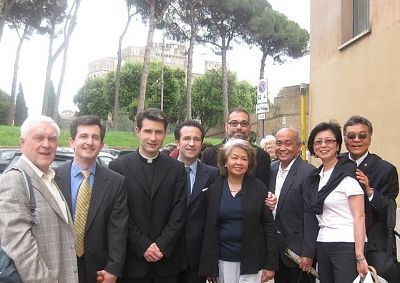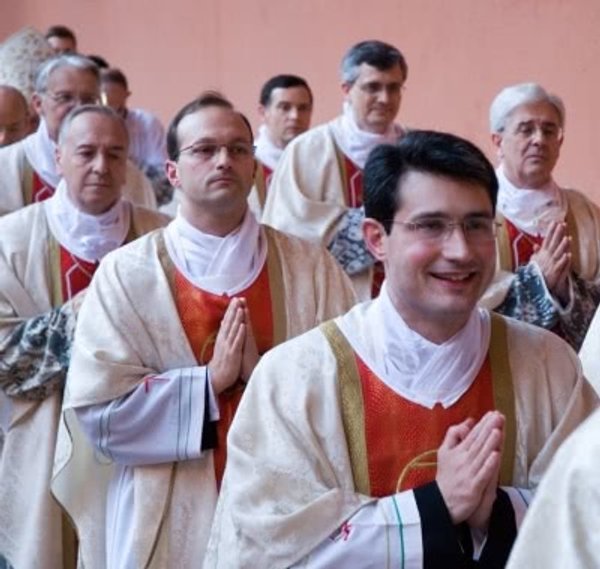You have studied theology and canon law in Rome for over three years. How will you remember the Eternal City?
I have many, very many memories. Perhaps the most vivid ones at present are the two occasions I had for a personal meeting with Benedict XVI.
In both cases, I was working as a translator in support of the Synod of Bishops (in October 2008 and October 2009), events which gave me a special insight into the aspirations and challenges of the Church in the third millennium. For three weeks, a small group of students from the Santa Croce were at the heart of the universal Church, assisting the Holy Father and more than 200 Bishops with translation services. We manned translation booths morning and afternoons, providing accurate renderings of the interventions given by the Pope, the Synod Fathers, auditors and other participants. We spent numerous hours preparing texts and providing faithful live translations. Being physically close to the Holy Father and hearing the interventions brought me to pray fervently for the different dioceses and the Pope's Intentions.
Each year the translators were able to greet the Holy Father and exchange a few words. In my opportunity, I told him that I offer my daily work for him and his intentions, he asked where I was from and upon hearing the response, he repeated "Canada!" in a cheerful tone.
This year’s meeting touched me especially, given that I would soon be ordained a priest. I told the Pope of my upcoming ordination and he replied “I will pray for you”. His words immediately inspired happiness and serenity in my soul.
More than anything, this experience helped me to see the Holy Father’s humanity. He has received a mission to shepherd the Church, to which he brings his many talents, but ultimately he is a servant, who needs the prayers and support of all the faithful. I’ve grown in the knowledge, that I’m also responsible for helping the Pope in his vigilance over the universal Church.

What can you tell us about your experience at Santa Croce?
As a student from North America, I have been pleasantly surprised with the exchange of cultures and languages that exists at the Santa Croce, with students from over 40 countries, all dedicated to their studies and becoming Romanized. I have canon law colleagues from Mongolia, Ecuador, Cameroon, to name a few places, who have enriched my experience of the Church and the diversity of apostolates and holiness that is present throughout the world.
Precisely for this reason, I’ve been able to open my eyes and heart to the problems of the Church, which, ultimately, are the problems of the world. The re-evangelization of formerly Christian countries, the effects of poor formation in local churches with few resources, understanding how communion with the Pope and the Bishops is of vital importance to the sanctity of the Church, these a just a few of the issues that I’ve been exposed to and transformed by, during my years at the Santa Croce. Basically, I have felt myself becoming more catholic, more universal.
Before studying theology and canon law in Rome, you practiced law for a number of years. Can you tell us how that will affect your work as a priest?

I studied the common and civil law traditions in Canada before working as a barrister and solicitor in the province of Ontario, both in Ottawa and Toronto. Through those long years of study, apprenticeship and professional development, I learned the virtues of industriousness, meeting deadlines with serenity, meticulous preparation of cases, and understanding and dedication to the needs of clients. The habits acquired have stayed with me, taking on another dimension in the student years here in Rome.
I can sincerely say I have a thoroughly lay, more than legal, mentality in terms of knowing the situations of the workplace, the difficulties that arise in human relations, including the short sightedness that can many times lead to personal sterility, or the magnanimity of treating others with respect and full confidence. Having worked in diverse situations will help me as a priest to comprehend the challenges of lay people and provide them with practical spiritual advice.
Are you thinking of returning to Canada soon?
I certainly want to, but I could well be one of those the Prelate thinks of when he said that many hands are needed to collaborate in the expansion of the apostolates of Opus Dei to many countries – Indonesia, Korea and Romania are only the latest examples. As a priest I want only to serve souls, without any distinction.
I expect to finish the licentiate in canon law in late June, and will then commence work on a doctorate in canon law. The proposed topic concerns religious freedom and parental rights to education in North America . Then I’ll serve in the activities of Opus Dei wherever I’m needed. Honestly, I’m pretty excited about returning and commencing work as a priest.
What do you find particularly attractive in the life of the founder of Opus Dei?
St. Josemaria was a model of priesthood to which I aspire. The testimony of his life has often helped me in the silence of my prayer, as well as in difficult moments, to light a fire in my soul to be a more faithful instrument of God. I am particularly inspired by his priestly ministry during the Spanish Civil War. On one occasion, when he and several others were sure they were about to be killed, he entrusted himself to God and gave absolution to his companions. Years later he recalled that in that moment, though he desired to die for Christ, his legs were trembling. St. Josemaria’s heroic example incarnated the truth that Christ must be present everywhere there are men and women struggling with the demands of life.
In our society, we don’t often experience such direct persecution. We face something subtler, something that borders on indifference. Even if we are not threatened or shunned, the lack of religious faith makes the priestly witness all the more important. In this way, I see St. Josemaria’s life as a path to follow in my calling to the priesthood.
Note: Part One of this interview can be found here
